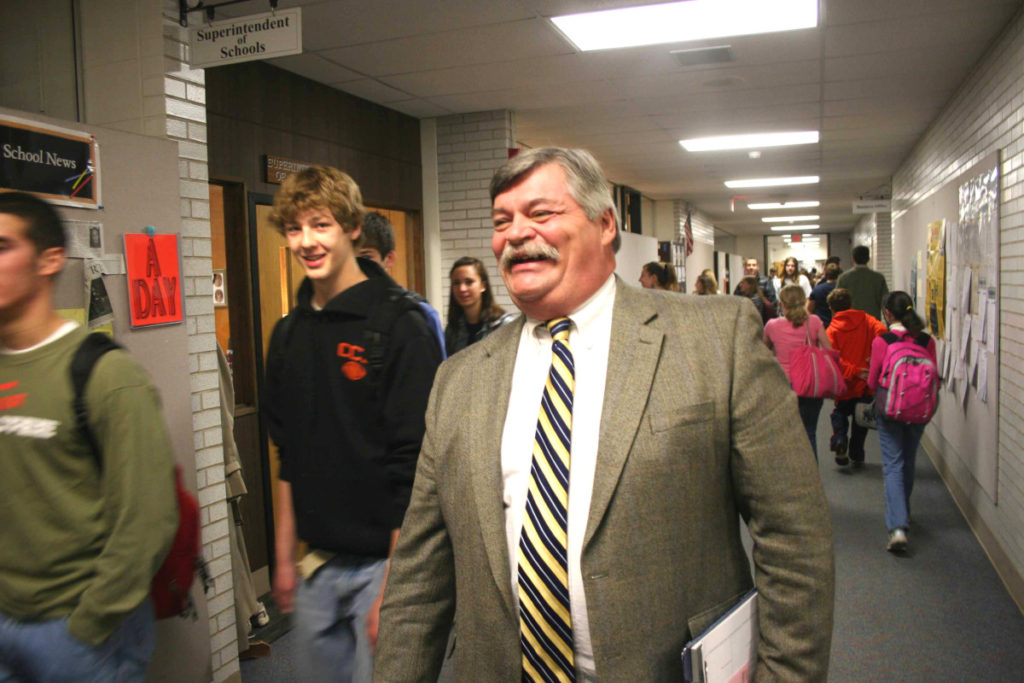Editorial April 6, 2018
Why Parkland? Maybe We
Don’t Care For Kids Enough

Here’s an idea. To ensure no student feels neglected, assign every teacher and staff member to meet weekly with 10 high schoolers. Nothing complicated. Maybe a quick cup of coffee or short chat, so the young man or woman knows somebody cares.
Gary Kuch, now director of the Clark Scholarship Program, Otsego town justice and Cooperstown’s “first man” to newly sworn-in Mayor Ellen Tillapaugh Kuch, has been involved for almost four decades in identifying troubled young people and getting them back on track – since 1981, when he was hired as school psychologist in the Fort Plain school.At the time, a drug bust, big enough to make The New York Times, had taken place in that Mohawk Valley community, and people were worried about drugs in the school.
Kuch soon found himself in a room with 100 other young educators from urban and rural schools at Super Teams Operating Co. in Southampton, L.I., struggling with questions that still bedevil us today after the 17 shooting deaths Feb. 14 at Marjory Stoneman Douglas High School in Parkland, Fla.
Super Teams was operated by the late Dr. Gerald Edwards, and over the decades would train consultants like Kuch to then train tens of thousands of people to create happier, more connected students and, in the process, avoid situations like Parkland’s.
As it happened, it was teachers and staff themselves who proposed mentoring 10 students each at one school where Kuch, who would become Cooperstown High School principal and retire as Worcester Central School superintendent, consulted after the Super Teams training.
“It’s difficult to plan something when you’re connected with an adult,” Kuch explained.
When a tragedy like Parkland’s happens, there’s a flurry of protests, although few as large as the nationwide “March for Our Lives” Saturday, March 24, from Oneonta to Oregon, and multiple measures proposed – and usually defeated – in state legislatures and Congress. (Who knows, this time may be different.)
But Kuch’s perspective – he frequently speaks at RYLA (Rotary Youth Leadership Award) conferences – was detailed at the Cooperstown Rotary Club’s weekly meeting March 20. In effect, all schools should be tending all of their students all the time, particularly in our local schools, which are small enough that “everybody should be known by an adult.” If so, “I think you can do a lot of prevention.”
Not just teachers and staff, but “school bus drivers were some of my best resources. They see the kids first thing in the morning. They spend more time with them than most teachers.” You want students to be comfortable enough to tell an adult, “I don’t know if this is important, but you need to know that I saw this or heard something.”
A lot of Kuch’s consulting involved setting up peer-mentoring programs, a memorable one at Wappingers Falls, near Poughkeepsie, notorious for the Tawana Brawley case. At the time, there was a lot of violence in the school, and a number of suicides.
“It became crystal clear students would talk to students before they would talk to adults,” he said. “But they had nowhere to go if they heard someone thinking serious about doing something.”
As principal and super, Kuch always listed his number in the telephone book. The public rarely abused that access. And at 11:30 one night, he did receive a call that allowed him to defuse what could have been a dangerous situation at school the next morning.
When CCS principal, he made it a point of standing by the door each morning, welcoming every student by name. “That ‘good morning’ may be the only positive thing they hear all day,” he said.
Has the world changed since Kuch first trained at Super Leaders? Except for greater availability of semi-automatic guns, no, he says.
What’s the point of all this? After the shooting, it’s too late. Caring, whether in teachers and staff or a fellow student, enhances education and creates safer schools. Certainly, every school board member, superintendent and principal in Otsego County should be doing an audit of their operations: Does communication exist? And, if not, how do we start the conversation. Does enough caring exist? If not, how do we create it?
“We tend to be reactive,” said Kuch. “What I’m suggesting is: If we know these things are true, why aren’t we doing this proactively?
“There are communities who have bought into it big time and have made a real impact on drug addiction and violence. It doesn’t take a lot of money. It doesn’t take a Ph.D. It takes a committed group of people who want to do something.”
Amen.

